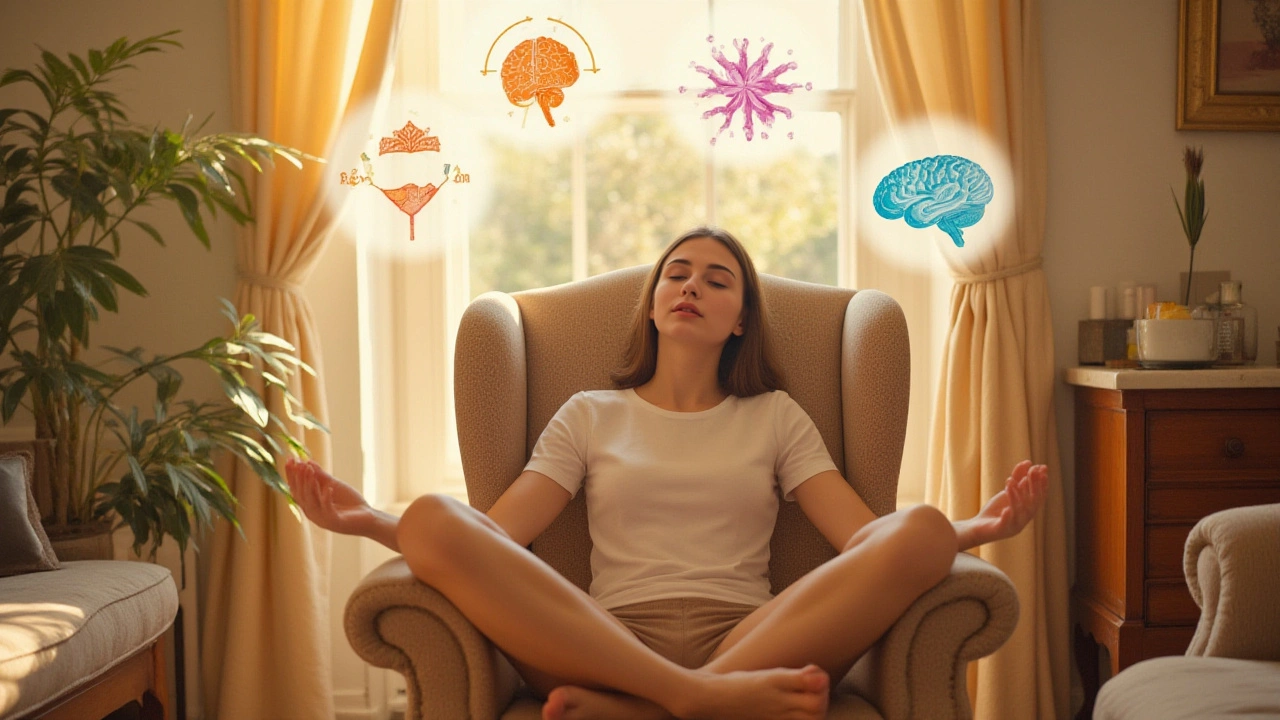How Massage Therapy Boosts Mental Health: Science, Benefits, and Tips

Ever noticed how a soothing muscle rub can turn a rotten day around? There’s a bigger story behind those kneading hands—one that goes way past sore shoulders. All around the globe, people book massage sessions hoping for stress relief, but there’s mounting proof that massage therapy can actually shift your mood, ease anxiety, and help keep you mentally steady. The link between massage and mental health isn’t just about feeling good for an hour; it actually sparks real changes in your body and brain that add up to long-term benefits.
How Massage Affects Your Mind and Body
Our nervous systems love a good back rub. Here's what actually happens: as your muscles relax, your body dials down on stress hormones like cortisol and cranks up the release of feel-good chemicals—serotonin and dopamine included. Scientific experiments have literally measured drops in blood pressure and heart rate during a session, and some research from trusted places like the Mayo Clinic shows reductions in anxiety and depressive symptoms after just a few massages. It isn't magic; it’s your nervous system flipping from fight-or-flight to a chilled, rest-and-digest mode. The fascinating part? This physical calm sends feedback to your brain, signaling, “Hey, we’re safe, you can relax.” That quiet signal may sound simple, but it makes a difference especially if you’re grappling with chronic stress, insomnia, or persistent anxiety.
Mental health often slips when our bodies are tense, sleep gets wonky, or we never give ourselves a break. By melting away those persistent aches, massage can almost act as a reset button. Studies out of universities in Miami and Pennsylvania found that people struggling with long-term anxiety and depression reported actual shifts in mood and their ability to sleep after regular sessions. And this isn’t just about expensive spa treatments—many community clinics and even workplace wellness programs have started offering shorter chair massages with real stress-busting effects. So, whether it’s fifteen minutes or a full hour, your brain gets a proper break, too.
Another thing that sets massage apart: the power of safe touch. When you trust someone to ease the tension out of your body, there’s a psychological effect—we humans are wired for connection. Therapeutic touch, when practiced ethically and professionally, can boost feelings of safety and belonging, which are huge antidotes to anxiety and low mood. Think back to a time someone simply put a comforting hand on your shoulder during a tough moment; that sense of support echoes in each session, even if the focus is on your calves or back.
Massage therapy can also shift body awareness, helping people who feel disconnected from their own bodies (a common symptom in many mental health struggles) re-learn that their bodies can be safe and even enjoyable spaces. And that, honestly, is half the battle when your mind is constantly racing or stuck in repeating negative loops.
The Link Between Stress, Anxiety, and Your Body
Picture your worst stress—a looming deadline, a pile of bills, or worries that just won’t turn off. Now, think about what that does physically: tight neck, clenched jaw, shallow breathing, stomach all in knots. Anxiety and stress don’t just live in your head; they camp out in your muscles, mess with your appetite, toss your sleep, and leave you feeling drained. This is where massage therapy shows its hand by breaking that tension cycle. While it won’t erase the stressful stuff in your life, it gives your body a chance to slow down, send different signals to your brain, and hit pause on the adrenaline surge.
Real data supports this, too. Researchers from the Touch Research Institute published studies showing that just twenty minutes of moderate-pressure massage reduced levels of cortisol—the 'fight-or-flight' hormone—sometimes by more than 30%. At the same time, massage increases levels of serotonin by as much as 28% and dopamine by up to 31%, two key neurotransmitters linked to happiness and calm. This biochemical switch is one of the reasons people talk about feeling "lighter" or "clear-headed" after a session. If you’re prone to panic or chronic stress, these numbers are a big deal.
Massage can play an important role if you're stuck in a tension rut. Physical relaxation tells the mind: you’re not in danger right now. Even people with PTSD or chronic anxiety can use massage as one piece of a bigger mental health puzzle. Some therapists even work with mental health counselors to support trauma recovery, providing trauma-informed touch that feels safe and grounding instead of invasive. Feedback from these clients often includes better emotional regulation and improved trust—not just with others, but with their own body’s responses.
It goes deeper, too. When you’re under constant stress, the immune system often takes a hit. Some studies found that patients who received regular massage had increased activity of natural killer cells—those are the cells that fight off viruses and keep you from getting every cold going around the office. So, if you’re juggling life stress, massage isn’t just about your mood; it helps your body bounce back physically as well.

Different Massage Techniques and Their Mental Health Benefits
Massage isn’t one-size-fits-all. There’s a patchwork of techniques out there, and each one has its own perks when it comes to supporting mental health. Let’s unpack a few of the most common options and how they might help you feel better from the inside out.
- Swedish Massage stands out for its gentle, sweeping strokes and rhythmic kneading. Research from Swedish hospitals shows that even just three weekly sessions over a month improved symptoms of depression and fatigue in patients recovering from illness. It’s a great go-to for those who want an all-over mood lift and serious relaxation.
- Deep Tissue Massage gets down to the muscle knots that won’t budge. This type is great if you’re carrying stress in your neck, shoulders, or back. Athletes often credit it for faster recovery, but folks battling chronic tension or hours at a desk report clearer thinking and reduced anxiety afterward. Just be warned—it can be intense, so speak up with your therapist about pressure.
- Aromatherapy Massage adds essential oils like lavender or peppermint to the mix. Big studies from France noted that lavender oil boosts relaxation and even supports people with mild insomnia. The combo of scent and touch targets multiple senses, making stress relief more effective.
- Head and Scalp Massage eases tension headaches and mental overload, especially for those glued to screens. This type has exploded in popularity in stressful cities like London or New York, where a few focused minutes can turn the tide on an anxious day.
- Lymphatic Drainage Massage helps reduce fluid retention and encourages detoxification. Emerging evidence links lymph work to reduced symptoms in people who report “brain fog” or mild depression. It’s often used alongside other therapies in wellness clinics the world over.
Pick the style that feels right for your needs, and always chat with your massage therapist about what’s going on emotionally—not just physically. Good therapists welcome the conversation and can tailor sessions for more than just relieving muscle pain. Plus, mixing things up (like adding hot stones or a focus on hands and feet) keeps your brain responding and prevents each session from feeling routine.
Tips for Making Massage Therapy Work for Your Mental Health
Getting something out of massage therapy isn’t just about showing up; it’s about how you approach the whole experience. Here’s what people who get the most out of their massages do differently:
- Talk openly with your therapist—not about your deepest trauma, but about how stress or anxiety shows up for you physically. If you tell them you can’t sleep, feel “wired and tired,” or carry all your stress in your neck, they’ll know where to focus.
- Consistency pays off. One-off massages are a treat, but studies from the American Massage Therapy Association found the benefits snowball with regular sessions—at least once every two weeks delivers the best results for stress reduction and mood stability.
- Set an intention before each appointment. Ask yourself, “How do I want to feel afterward?” Whether it’s clearheaded, energized, or simply safe in your own skin, bring that wish with you when you walk in. Mindset shapes experience.
- Combine massage with other self-care. Try pairing it with meditation, gentle yoga, or walks in nature. The more you stack healthy routines, the more benefits tend to stick.
- Don’t ignore emotional reactions. Sometimes relaxation brings tears or unexpected feelings. There’s nothing weird about it—your body is letting go of stress, and emotion comes out. Let your therapist know if anything feels strange or overwhelming.
- Watch for real changes. Are you sleeping better, less irritable, more focused, or less antsy after sessions? Take note, and celebrate those wins, even if they’re subtle. These small gains add up over weeks and months.
- If money is tight, search out community clinics, massage schools (where prices are lower), or look for shorter chair massages in local wellness fairs and offices. Even brief, affordable sessions can spark mental health improvements.
- Massage can never replace professional mental health treatment, but it works brilliantly alongside traditional therapy. If you see a counselor for anxiety, depression, or trauma, ask them about adding massage to your wellness plan. Some therapists even partner with massage practitioners for integrated care.
Ready to book your next session? Remember, results build over time, and what matters most is finding a therapist you click with. It’s about building trust—and giving yourself permission to feel better, little by little.

Myths About Massage Therapy and Mental Health Busted
Let’s clear the air on a few fuzzy ideas. First up—no, massage won’t erase clinical depression or “fix” all mental health issues overnight. It’s a tool, not a cure. You still need your doctor, therapist, or counselor if things are rough. But you don’t have to buy into the myth that massage “does nothing” for your mind. Real science says otherwise.
Another myth is that massage is just for the super wealthy or spoiled. Tons of workplaces, community centers, and health programs now offer access at sliding scale prices. University hospitals even use massage in palliative care and psychiatric wards because of its effects on anxiety, agitation, and comfort.
Some people worry about “getting addicted” to stress relief. Honestly, there are far worse habits to have. If regular massage helps you stay calm, function better, or just not lose your cool on the subway—that’s a win.
Don’t let stigma or old attitudes make you write massage off as a fluffy luxury. The brain is wired for touch, safety, and connection, and the science backs up what people have felt for centuries. As the field keeps evolving, more therapists are being trained in trauma-aware methods and pairing massage with emerging wellness tools. Who knows—your next session might hit you in ways you didn’t expect.
So, when life weighs heavy, don’t shrug off the power of a skilled pair of hands. Massage therapy is more than a passing trend; it’s a grounded, evidence-based way to calm the storm inside you. And that’s something everyone could use a little more of these days.


